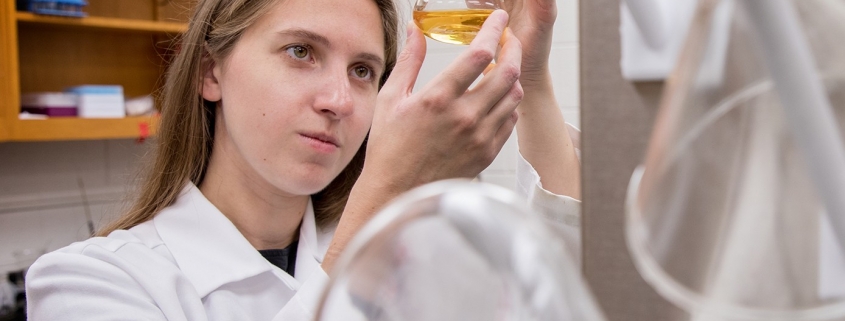UGA students, alumni receive NSF Graduate Research Fellowships
This story was written by Sam Fahmy and was originally posted to UGA Today on June 17, 2019.
Doctoral student Jordan Chapman said he was attracted to the University of Georgia by the opportunity to conduct research at the intersection of geoscience and archeology, while Morgan Ashcraft chose to pursue her Ph.D. at UGA so that she could apply nanotechnology to drug delivery systems. Isabella Ragonese is studying the interactions between global climate change and animal behavior through the Interdisciplinary Disease Ecology Across Scales Program.
These doctoral students are among seven UGA graduate students to earn highly competitive National Science Foundation Graduate Research Fellowships this year, and six UGA alumni also have earned the fellowship, which includes three years of financial support that includes an annual stipend of $34,000 plus a $12,000 cost of education allowance and networking and professional development opportunities.
“The NSF Graduate Research Fellowships recognize the best and the brightest,” said Graduate School Dean Suzanne Barbour. “That so many UGA graduate students have been and continue to be recipients of the NSF GRF is a testament to the outstanding training environment that our institution provides at both the undergraduate and graduate levels.”
Chapman is pursuing doctorates in geology as well as in anthropology under the mentorship of Jeff Speakman, director of the university’s Center for Applied Isotope Studies, and professor Victor Thompson in the department of anthropology, part of the Franklin College of Arts and Sciences. His research combines archaeology and cutting-edge technologies to explore historical power dynamics on plantations along the Georgia coast. “As I began to take courses, I realized that archaeology was a broad and interdisciplinary field,” he said. “This eventually led to my interest in geology—and, hoping to pursue both—my focus settled on the subfield of geoarchaeology.”
After graduation, he plans to continue to conduct research and to inspire members of underrepresented groups to pursue careers in science through the Black Science Coalition and Institute, a nonprofit he founded.
Ashcraft, who earned her bachelor’s degree in chemistry from Cleveland State University, is pursuing a Ph.D. in pharmaceutical and biomedical sciences in the College of Pharmacy. “I chose UGA for graduate school because there were a number of research projects here that I was interested in, primarily Dr. May Xiong’s work in nanomedicine,” she said, adding that she is currently working to create new antibiotic therapies for the treatment of bacterial infections.
Ragonese is pursuing her doctorate in ecology through the IDEAS program, which trains scientists to view infectious diseases through scales that range from the cellular to the global.
“The Odum School of Ecology is a great place to study infectious disease ecology,” Ragonese said, “and there is a wonderful sense of community here.” After graduation, she plans to conduct applied research at a government agency or non-governmental organization.
Like Chapman, Ashcraft and Ragonese, the additional NSF Graduate Research Fellows pursuing degrees at UGA come from highly regarded universities that range from nearby Emory to Whittier College in California and the University of Michigan, among other institutions.
Outstanding alumni
UGA’s recipients of NSF Graduate Research Fellowships also include alumni who used their UGA educations as foundations for graduate studies at some of America’s most highly regarded universities.
Patrick Griffin, who earned his B.S. in genetics, was an Honors student during his time at UGA and is currently studying aging in the department of genetics at Harvard Medical School. “My mentor at UGA was (associate professor) Bob Schmitz,” he said, “and I was also greatly helped by (professor) Janet Westpheling. UGA was a wonderful environment to learn about basic science and gain experience presenting my research to others through events like the CURO Symposium.”
Like Griffin, Aleia Bellcross credits faculty mentors and opportunities such as CURO with preparing her for success in graduate school. Bellcross is pursuing a Ph.D. in chemistry at Northwestern University with a focus on atmospheric chemistry.
“UGA prepared me in a lot of ways for graduate school,” she said. “I was very fortunate to gain early research experience with professor Geoffrey Smith and his group, where I benefited from strong mentorship and a supportive environment. UGA provided all the resources of a large R1 institution, but still felt like a small and close-knit community.”
Hayley Schroeder, who earned bachelor’s degrees in ecology and entomology at UGA, is pursuing a doctorate in entomology at Cornell and ultimately plans to focus her career on the conservation of insects that are important to agriculture. She earned the CURO graduation distinction and coordinated Project Monarch Health, a citizen science project based at UGA through which volunteers across North America sample wild monarch butterflies to help track the spread of a parasite that can harm monarchs.
“At UGA, I was pushed not only to ask my own research questions and develop my own ideas, but also to communicate them as well through outreach events, conferences and citizen science,” she said. “Incorporating the general public can strengthen the data you collect and increase the impact of your results. This is a lesson I will carry with me throughout my career as a scientist.”
A complete list of UGA’s 2019 recipients of NSF Graduate Research Fellowships and their fields of study is below:
UGA graduate students
Morgan Ashcraft, bioengineering, Cleveland State University
Philip Michael Newberry, ecology, Emory University
Jordan Chapman, archaeology, Penn State University
Isabella Ragonese, ecology, Skidmore College
Cydney Seigerman, cultural anthropology, University of Michigan
Trevor Tuma, science education, Whittier College
UGA alumni
Gwendolyn Watson (BS ’17), industrial/organizational psychology, Clemson University
Patrick Griffin (BS ’15), genetics, Harvard University
Aleia Bellcross (BSES ’17, BSCHEM ’17), environmental chemical systems, Northwestern University
Hayley Schroeder (BS ’18, BSES ’18), ecology, Cornell
Emma Brannon (BSBCHE ’18), chemical engineering, University of Michigan
Sarah Robinson (BS ’17), biostatistics, Rice University
Dionnet Bhatti (BS ’15, BS ’15), neurosciences, The Rockefeller University









